What the Chronicle is reading
July 8, 2020
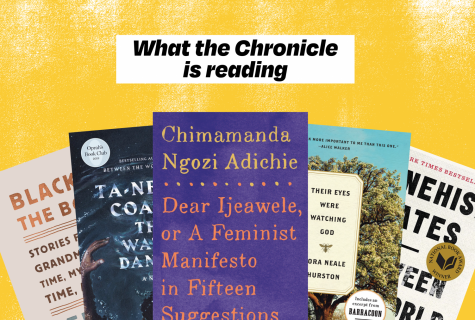
It’s easy to assume people around us experience the world the same way we do, but that isn’t the case. Reading and consuming work by Black creators detailing the Black experience is not only important but essential in understanding the depth of the Black Lives Matter movement.
The Chronicle firmly believes that knowledge is power, and continuously consuming work by people who do not have the same life experiences as us builds upon our knowledge, empathy and understanding.
And for those of us who are part of underrepresented or marginalized communities, it’s sometimes reassuring to read books by someone with a similar experience.
The Chronicle put together a list of books we are reading this summer and why you should read them too.
“The Water Dancer” by Ta-Nehisi Coates. Picked by Curtis Lawrence, faculty adviser.
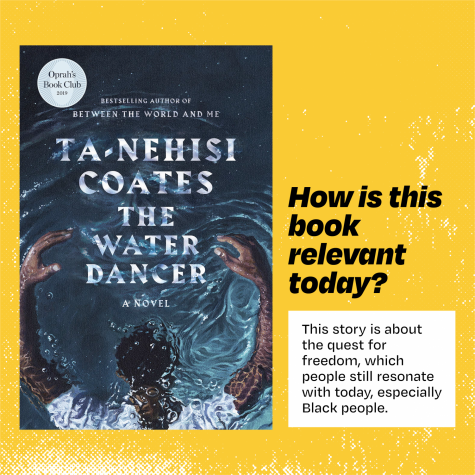
Synopsis: The book’s main character was born into slavery and was separated from his mother at a young age, eventually connecting with the Underground Railroad movement. The story is told by the book’s hero and narrator, Hiram Walker, who has a special gift that allows him to magically travel from plantations and jails in the South to abolitionist communities in the North. In the journey, Walker experiences love, loss, rage and eventually understanding.
How is this book relevant today?: This story is about the quest for freedom, which is still relevant today, especially for Black people. Although the present struggle is different—we are not in the same kind of bondage as the hero of this book—there are many similarities. Fighting for freedom and equality today still requires strength, courage and fortitude.
What has this book taught you?: Freedom has a price, for the person seeking it and the person or institution withholding it. The book made me appreciate the sacrifices of those who came before me and contemplate the price and sacrifice for my freedom and freedom for those who follow.
Why should people read this book?: For those who want to learn more about the journey of the enslaved, Coates’ description of this life is culled from his study of narratives from the formerly enslaved. For those who consider themselves fairly educated about America’s curse, they will be reminded that we all possess something that allows us to see light, even when we are in the darkest of places.
“Dear Ijeawele, or A Feminist Manifesto in Fifteen Suggestions” by Chimamanda Ngozi Adichie. Picked by Mari Devereaux, co-editor-in-chief.
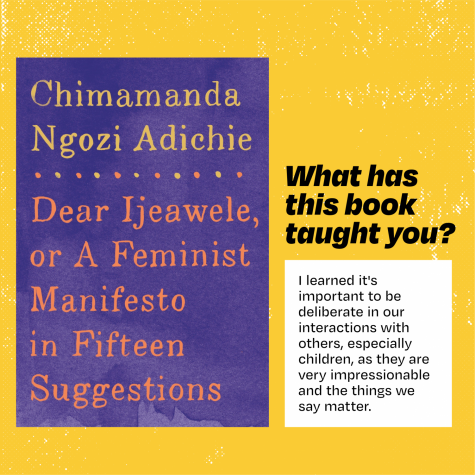
Synopsis: The book is basically an open letter to parents wanting to raise their daughters (although it could be used for all children, really) to be strong feminists who have self-worth and believe in true equality. Among her 15 suggestions, Adichie tells parents how they can approach lessons about appearance, sex, gender roles, oppression, identity and culture to help their children become more independent, grounded and confident.
How is this book relevant today?: Many parents, especially those who are looking to empower their children, are always in search of a guide to help them raise their children to be accepting and the best versions of themselves.
What has this book taught you?: I learned it’s important to be deliberate in our interactions with others, especially children, as they are very impressionable and the things we say matter. With the right amount of time and education, we can unlearn what we have been taught and set a better example for younger generations about how the world should work and how we treat each other.
Why should people read this book?: While the book was written as a guide for parents, it also serves to help adults relearn the things they’ve been taught about femininity, womanhood, feminism and gender roles, as well as how those shape society in a negative way. We need to educate ourselves now so the future can be better for all women.
“Their Eyes Were Watching God” by Zora Neale Hurston. Picked by Kendall Polidori, co-editor-in-chief.
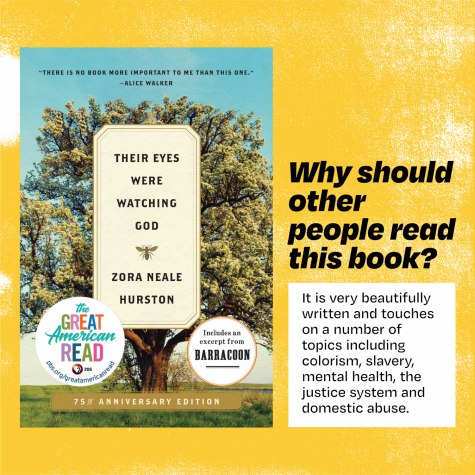
Synopsis: The book follows a middle-aged Black woman, Janie Crawford, who is arranged by her grandmother to marry Logan Killicks, an older farmer. But, Killicks does not feel love for Janie and just wants a “housewife.” No one understands Janie’s desire to find real love. She eventually falls in love with Tea Cake, a Black man, who tries to shoot her in a fit of rage before she defends herself by shooting and killing him. Janie is tried by an all-white jury and is sent home free.
How is this book relevant today?: It dives into the reality of America’s systemic racism and shows how race and colorism have always played a role in the justice system. Because Janie shot and killed a Black man, she was found not guilty.
What has this book taught you?: To look deeply at the systems in place and dissect how privilege plays a role in everyday life. It also highlights the systemic barriers for people of color and shows that the system is literally designed to work against them.
Why should people read this book?: It is very beautifully written in a lyrical dialect and touches on a number of topics including colorism, slavery, mental health, the justice system and domestic abuse.
“Black is the Body: Stories from my Grandmother’s Time, My Mother’s Time, and Mine” by Emily Bernard. Picked by Brooklyn Kiosow, copy editor.
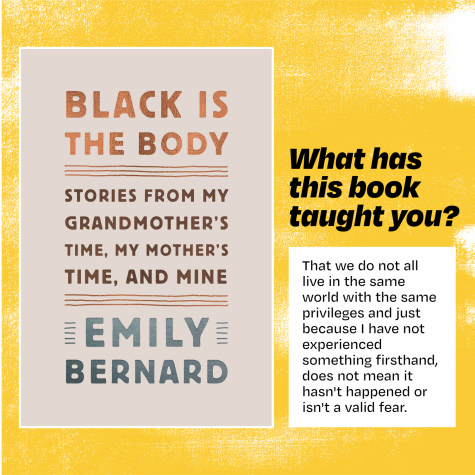
Synopsis: This autobiographical prose details the difficulty of interracial marriage and friendship, adoption, parenting, teaching about the n-word and how to feel at home in both your body and location.
How is this book relevant today?: This book is about the dangers of being a Black person in the present moment. Bernard is married to a white man and she writes: “I know when the girls go out with [my husband] they are going to come back … alive and that this is because of the color of John’s skin.” She details her Black experience, along with her mother’s and grandmother’s.
What has this book taught you?: We do not all live in the same world with the same privileges and just because I have not experienced something firsthand, does not mean it hasn’t happened or isn’t a valid fear. It is also important to not only consume work that details Black suffering and pain, but to empathize and fight for and with Black people.
Why should other people read this book?: Bernard is a brilliant and nuanced writer, but more importantly, we should consume work by Black creators because their existence and human rights are continually violated and questioned. This book is not just about Black struggle, but about being Black as the Black experience cannot be defined by one moment or incident.
“Between the World and Me” by Ta-Nehisi Coates. Picked by Camilla Forte, director of photography.
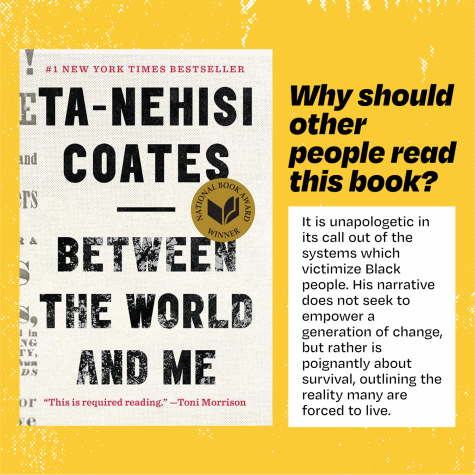
Synopsis: Written in the form of a letter to his 15-year-old son, this is Coates’ attempt to answer the complicated questions about race and the realities of being Black in America. The book covers his awakening to the truth about his place in the world and the U.S. through a series of experiences he has had throughout his life told as vignettes.
How is this book relevant today?: The book, which was written in the wake of Trayvon Martin’s killing, lays out realities that are just as vivid after the killing of George Floyd, drawing on the realities of discrimination that are perhaps more obvious to people today.
What has this book taught you?: It focuses on how different the Black experience is to that of any minority group in the U.S. due to its intricate history and systemic nature. Because I’ve lived much of my life in America as an immigrant, Latinx woman, I attempted to use my own experiences with discrimination to empathize with the Black experience many times. This book allowed me to better understand how equating the two undermined both, and was counterproductive to progress.
Why should other people read this book?: Part of what makes this book so powerful is the fact that it’s not addressed to white people. It is unapologetic in its call-out of the systems which victimize Black people. His narrative does not seek to empower a generation of change, but rather is poignantly about survival, outlining the reality many are forced to live.







